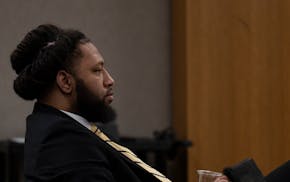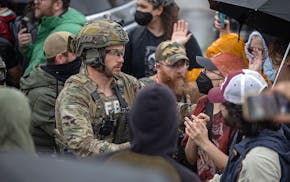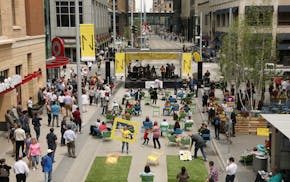Thousands of Minnesotans will step up to work in polling places on Nov. 5, despite an increasingly charged and divisive presidential election season throughout the state and beyond.
Some 30,000 election judges — critical workers tending to the business of voting — will staff roughly 3,000 polling places across the state, according to Secretary of State Steve Simon.
That number has held true this year despite increased threats against election workers nationwide, spurred by false claims of voter fraud stemming from the 2020 election by former President Donald Trump and his allies.
"There's a great phrase that says a polling place is meant to be oasis of calm," Simon said in a recent interview. "In Minnesota, for the most part, they have been."
But nationally, a survey of local election officials by the Brennan Center for Justice earlier this year found 1 in 3 have experienced threats, harassment or abuse, a dire phenomenon that has increased since 2020.
Simon is confident that clear-cut state laws dictating practices and norms in the polling place, as well as a new law protecting election workers from threats and harassment, an enhanced focus on security and de-escalation training for some workers will ensure a safe and secure Election Day.
"That's not to say it couldn't go wrong, but we do have the structures and the laws that are very clear about who can be [in polling places] and what they can and cannot do," he said.
In Minnesota, only authorized people are allowed inside a polling place during voting hours, including voters and election judges, plus a challenger from each major political party. And people are not permitted to linger in the polling place or within 100 feet of the building.
None of the handful of election judges interviewed by the Star Tribune in recent weeks said they were fearful of working in the polling place. All said they regarded the work as their civic duty — wages vary by location.
"It's been nothing but overwhelmingly positive," said AK Mohamed, an election judge from Shakopee who also serves as a Somali interpreter in the polling place. "There's been no tangible negativity that I can point to that makes me reconsider doing what I do."
Others agree. When asked if she's facing a shortage of election judges this year, Caryn Scheel of Minneapolis' Elections and Voter Services answered with an emphatic no: "I have a waiting list of over 100!" She's already recruited 2,680 election judges to work in the city's 137 polling places.
But Michelle Witte, executive director of the League of Women Voters of Minnesota, said the combination of the election's rancor and COVID may have made it harder to recruit election judges. "Older people might feel vulnerable, particularly because of their health," she said.
Security at the polling place
This election season, Simon has alluded to increased security in some precincts given the tense national climate — just last month his office was evacuated after receiving a suspicious package from the "United States Traitor Elimination Army." For the first time, a team in his office consults with counties and cities on "physical security."
That may involve installing glass or panels to safely route voters through a precinct or partnering with local police and sheriffs' departments should a security problem surface.
"The basic rule in Minnesota is you cannot preemptively post law enforcement at a polling place," he said. "A city can't say, 'Wow, Precinct Two, there's a lot of intensity there, let's just put a cop at the door.'"
Simon doesn't go deep into the details on security, though. "I don't want to give a total road map to the bad guys," he said.
But testimony at the Capitol last year on behalf of the new law bolstering protections for election and polling place workers indicated there's room for concern. One election worker was followed to her car by an angry voter; the head of elections in another county was called repeatedly on her home phone during off hours, and an official was lunged at by an aggrieved voter, forcing her to call the local sheriff.
Those who violate the law could now face civil damages and penalties of up to $1,000 for each violation.
The Brennan Center survey indicated more than 4 in 10 election leaders were concerned about recruiting enough poll workers due to threats of harassment and intimidation. This includes doxing — publishing a person's personal information online in a threatening manner — and swatting, fake emergency calls that result in an armed response being sent to someone's home.
"Election officials are working to prepare for everything right now," said Liz Howard, director of partnership engagement at the Brennan Center. "More than 90% of election officials have made improvements to election security since 2020."
Mary Brodd, an election judge from Woodbury, said "sometimes people make snide remarks" at the polling place, though they haven't made her feel unsafe. "A lot of people seem miffed or perplexed that we don't require them to show us their driver's license," she said.
Brodd suggests that people who distrust the voting process should work as an election judge. "You will see it's a legitimate process," she said. "You will learn you don't have anything to worry about."
Achieving party balance
Simon said one of the challenges this year involves recruiting poll workers to meet the state's party balance requirement for polling places, although election judges aren't required to declare a party.
"In very red areas [of the state] they have difficulty finding blue election judges, and in very blue areas they have the same difficulty finding red election judges," he said.
In some cases, party leaders can assign election judges where they're needed, since poll workers are not required to work in precincts where they actually live.
Republican strategist Jonathan Aanestad, chairman of Wayzata-based Minnesota Election Integrity Solutions, said some election judges recruited by his organization have had problems going to Minneapolis polling places "due to fear of crime and carjackings." Parking in the city was also a concern.
In the 2022 election, Aanestad said his organization rented a bus with a security guard to accompany judges from greater Minnesota to polling places in Minneapolis.
But Shelly Lacher, a longtime election judge from south Minneapolis, sees the polling place as "the one place that is truly nonpartisan. You'd never, never guess the party affiliation of anyone."
"It's the one place where you're safe. You're not allowed to say anything," said Lacher, whose teenage daughter works at a different polling place in the city. "Everywhere else is so partisan."
Staff writer Chris Magan contributed to this report.
What we know about the federal raids across the Twin Cities
Legislators miss own deadline, eye possible weekend special session

In surprise testimony, brother says Derrick Thompson was driving in crash that killed 5 Somali women

Charges pending against 2 jailed Minneapolis raid protesters accused of assaulting officer

